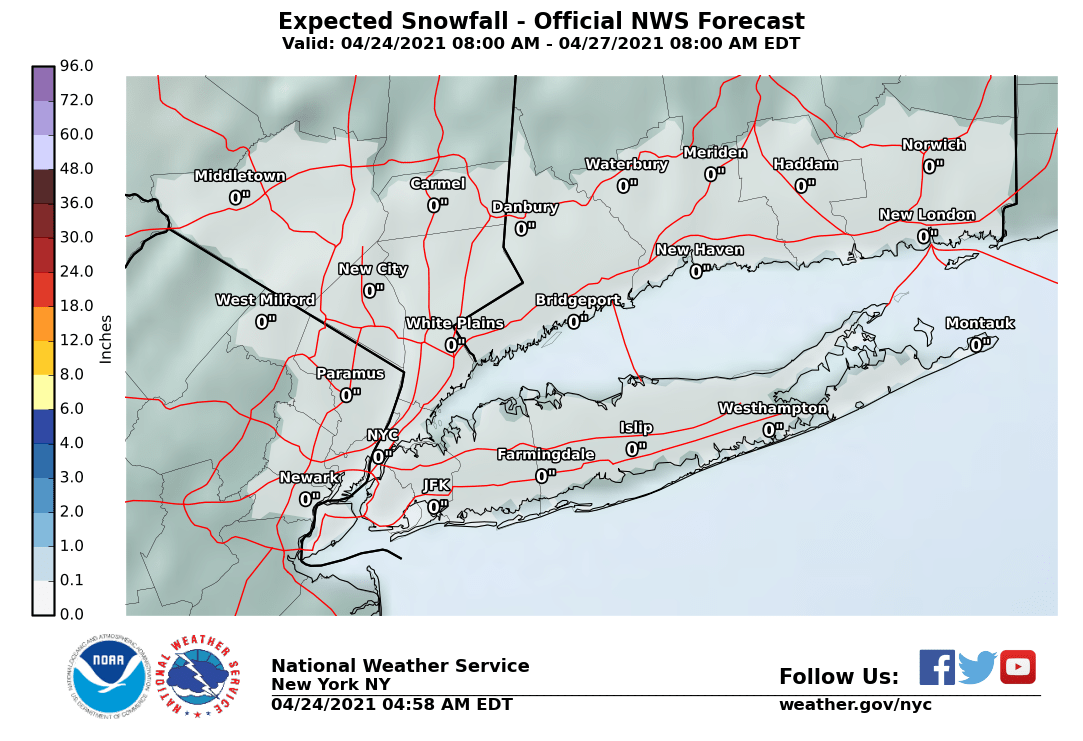
Mayor de Blasio today issued a hazardous travel advisory for Saturday, January 23, 2016 through Sunday, January 24, 2016. Nassau, Suffolk and Westchester Counties have issued similar advisories. The National Weather Service (NWS) has issued a Blizzard Watch for New York City from Saturday morning through Sunday afternoon. This system is forecast to bring heavy snow along with strong and potentially damaging winds, and will create slick and hazardous travel conditions. Stay tuned for the latest updates via Notify NYC, NYC Severe Weather.
What’s in store? For most of the region, the current NWS forecast is for heavy snow (8 to 12 inches forecast) and potentially damaging northeast winds of 25 to 35 mph with gusts up to 50 mph in much of the region. There is also likely to be coastal flooding over multiple high tide cycles.
How should I prepare? Travel during the storm may be extremely dangerous due to heavy snowfall, strong winds and whiteout conditions. Some roads may become impassable and strong winds may down power lines and tree limbs.
- Stock up with enough food and supplies. You might not be able to shop over the weekend.
- Have extra batteries on hand in the event of power outages.
- Check on your neighbors, especially those who are vulnerable.
Travel Safety Tips. New Yorkers are encouraged to take the following precautions:
Motorists
- If you must drive a vehicle, monitor weather and traffic reports for the latest road conditions. Use mass transportation whenever possible.
- Drive slowly. Posted speed limits are for ideal weather conditions. Vehicles take longer to stop on snow and ice than on dry pavement.
- Use major streets or highways for travel whenever possible.
- Four-wheel drive vehicles may make it easier to drive on snow-covered roads, but they do not stop quicker than other vehicles.
- Keep the name and phone number of at least one local towing service in your car in case you break down or become stuck in snow.
- If you get stuck on the road, stay with your car and contact a towing company.
Pedestrians
- Exercise caution and avoid slippery surfaces; some ice may not be visible.
- Wear layers including a hat, gloves/mittens, and a scarf to stay protected from the cold. And keep clothes and shoes dry, if a layer becomes wet, remove it.
- Keep fingertips, earlobes, and noses covered if you go outside.
- Have heightened awareness of cars, particularly when approaching or crossing intersections.
- Wear sturdy boots that provide traction to reduce slipping. Use handrails when using stairs.
- Seniors should take extra care outdoors to avoid slips and falls from icy conditions.
Safe Home Heating Tips
- Report any loss of heat or hot water to property managers immediately, and call 311.
- If homes lack heat, get to a warm place, if possible, and wear extra layers of dry, loose-fitting clothing, hats and gloves to help stay warm.
- Never use a gas stove to heat your home.
- Never use a kerosene or propane space heater, charcoal or gas grill, or generator indoors or near the home.
- Check on your neighbors, friends, and relatives — especially the elderly and those with disabilities and access and functional needs. People most likely to be exposed to dangerous winter weather conditions include those who lack shelter, work outdoors, and/or live in homes with malfunctioning or inadequate heat. Seniors, infants, people with chronic cardiovascular or lung conditions, people using alcohol or drugs, and people with cognitive impairments such as from dementia, serious mental illness or developmental disability, are at increased risk.
More Information
For more helpful tips for staying warm and safe, view NYC Emergency Management’s public service video announcement, or visit NYC.gov/EmergencyManagement. New Yorkers are also encouraged to sign up for Notify NYC, the City’s free emergency notification system. Through Notify NYC, New Yorkers can receive phone calls, text messages, and/or emails alerts about traffic and transit disruptions and other emergencies. To sign up for Notify NYC, call 311, visit NYC.gov/notifynyc, or follow @NotifyNYC on Twitter.
